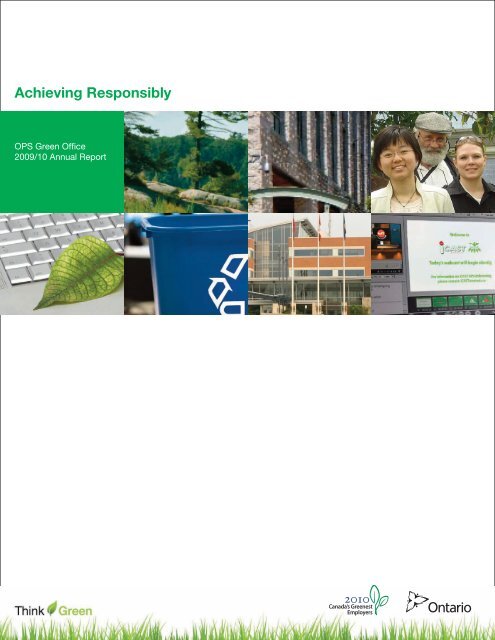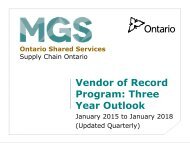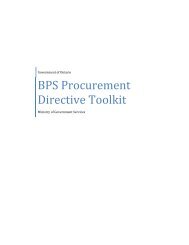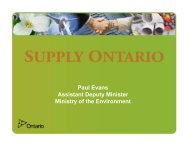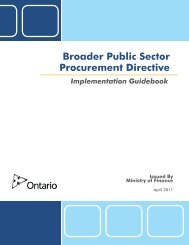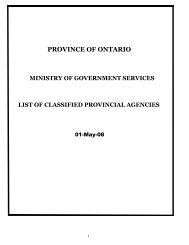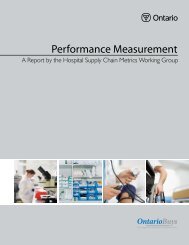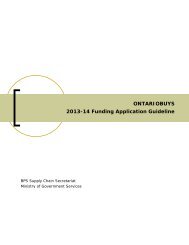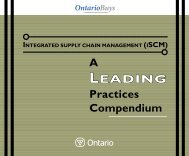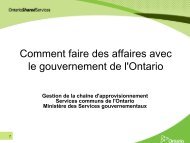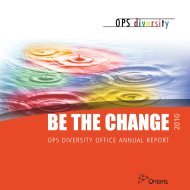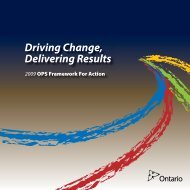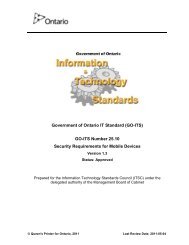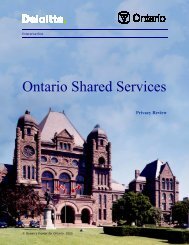Achieving Responsibly - Ontario.ca
Achieving Responsibly - Ontario.ca
Achieving Responsibly - Ontario.ca
Create successful ePaper yourself
Turn your PDF publications into a flip-book with our unique Google optimized e-Paper software.
<strong>Achieving</strong> <strong>Responsibly</strong><br />
OPS Green Office<br />
2009/10 Annual Report
<strong>Achieving</strong> <strong>Responsibly</strong><br />
<strong>Achieving</strong> <strong>Responsibly</strong><br />
Green Office<br />
A Culture of<br />
Consciousness and<br />
Commitment<br />
Conservation Through<br />
Technology<br />
PaperLess<br />
Building Sustainability<br />
Large Steps,<br />
Small Footprints<br />
Find Out More<br />
Message from Shelly Jamieson,<br />
the Secretary of Cabinet<br />
In 2009, the OPS took a big step toward becoming an<br />
environmental leader when we launched our Green<br />
Transformation Strategy. It lays out our plan to reduce the<br />
government’s environmental footprint, develop green<br />
business practices and build a workplace culture where<br />
“thinking green” is part of our daytoday reality.<br />
One year into our journey, I’m proud of the<br />
progress we’ve made. In this report, you will read<br />
about major initiatives underway, such as<br />
greening IT operations, reducing paper use and<br />
diverting waste from landfills. You’ll also find out<br />
more about innovative grassroots projects, led by<br />
dedi<strong>ca</strong>ted employees like you, that are making a<br />
real difference.<br />
Our efforts are being noticed. In April 2010, for<br />
the first time ever, the OPS was named one of<br />
Canada’s greenest employers. We were one of<br />
only 35 employers in the country to receive that<br />
honour, and I couldn’t be more proud.<br />
The really exciting news is that this is just the<br />
beginning. Everyone in the OPS has a role to<br />
play. With your help, we will continue to green<br />
our operations, foster a green culture across the<br />
OPS and reduce our impact on the environment.<br />
Message from Neil Sentance,<br />
Assistant Deputy Minister, OPS Green Office<br />
This is an exciting time of green transformation in the OPS.<br />
Across government, employees are pitching in to do what<br />
they <strong>ca</strong>n to reduce our environmental footprint. From<br />
planting trees and a community garden to saving paper and<br />
drinking tap water, employees are taking small steps every<br />
day that are making a big difference.<br />
It is those individual efforts on the part of OPS<br />
employees that will make it possible for the OPS<br />
to become an environmental leader. Our efforts<br />
are guided by the Green Transformation Strategy,<br />
an ambitious plan designed to put the OPS at the<br />
forefront of environmental sustainability in<br />
government operations. Over the past year, we<br />
have made signifi<strong>ca</strong>nt strides forward. This report<br />
highlights the important work that is underway,<br />
which includes:<br />
• Moving ahead on our Green Print Strategy aimed<br />
at cutting the OPS’ paper use in half by 2012;<br />
• Implementing an electronic equipment waste<br />
disposal program aimed at recycling 100 per cent<br />
of the government’s electronic waste;<br />
• Increasing the number of hybrids and fuelefficient<br />
vehicles and reducing travel to cut back<br />
on greenhouse gas emissions;<br />
• Reducing the environmental impact of our<br />
buildings through sustainable design,<br />
construction, operation and maintenance.<br />
These are just some of the achievements we have<br />
made so far by working together. I would like to<br />
thank our partners across government, our Green<br />
Team volunteers, and of course, all the dedi<strong>ca</strong>ted<br />
OPS employees who are helping to make green<br />
government a reality.<br />
I look forward to working with you all in the year<br />
ahead to build on our tremendous success.
Green Office<br />
<strong>Achieving</strong> <strong>Responsibly</strong><br />
Green Office<br />
A Culture of<br />
Consciousness and<br />
Commitment<br />
Conservation Through<br />
Technology<br />
PaperLess<br />
Building Sustainability<br />
Large Steps,<br />
Small Footprints<br />
Find Out More<br />
<strong>Ontario</strong> has a rich natural heritage – fresh water, fertile land, vast forests –<br />
and the <strong>Ontario</strong> government is committed to preserving that heritage for<br />
generations to come. The government has developed a broad range of<br />
initiatives which, together, will protect our environment, promote an<br />
innovative green economy and foster a culture of conservation.<br />
These initiatives are anchored by the 2007<br />
Climate Change Action Plan, which sets<br />
ambitious provincewide greenhouse gas<br />
emission reduction targets for 2014 and 2020<br />
and provides an overall framework for the<br />
government’s efforts to fight climate change. The<br />
2009 Green Energy Act is increasing the use of<br />
clean, renewable energy sources and assisting<br />
Ontarians to become more energy efficient, while<br />
the proposed Water Opportunities and Water<br />
Conservation Act will, if passed, encourage the<br />
development and export of clean water<br />
technology, sustain water infrastructure and<br />
promote conservation.<br />
The <strong>Ontario</strong> Public Service has a crucial role to<br />
play in the government’s fight against climate<br />
change. By being a leader in green business<br />
transformation, <strong>Ontario</strong>’s Public Service <strong>ca</strong>n<br />
serve as an example for reducing environmental<br />
impact and driving efficiencies. In September<br />
2008, the government established the OPS<br />
Green Office within the Ministry of Government<br />
Services to lead this transformation and to work<br />
with ministries to green all aspects of<br />
government operations.<br />
Plan<br />
The government has a plan to make this happen:<br />
The OPS Green Transformation Strategy.<br />
Approved in April 2009, the strategy has three<br />
interconnected goals:<br />
• Achieve targeted reductions to the<br />
government’s environmental footprint, including;<br />
• Reductions to GHG emissions by 19 per cent<br />
below 2006 levels by 2014 and 27 per cent<br />
by 2020. The government will achieve these<br />
reductions through reduced vehicle fuel<br />
consumption, air travel and energy in facilities,<br />
resulting in an overall cumulative reduction of<br />
82 kilotonnes (kt) of CO 2 by 2014<br />
• Reductions in other key consumption areas<br />
such as paper and waste;<br />
• Develop green business practices which<br />
integrate environmental sustainability into all<br />
aspects of the business lifecycle from<br />
acquisition to disposal; and<br />
• Build a green organizational culture to<br />
make environmental responsibilty part of the<br />
daytoday work of the OPS.<br />
Partnership<br />
All ministries are committed to achieving these<br />
goals. The Green Office has developed<br />
partnerships with key business areas across the<br />
OPS, including fleet operations, facilities<br />
management, procurement, environmental<br />
standards and policy, information technology and<br />
the Climate Change Secretariat, to drive the<br />
government’s green transformation agenda.<br />
These same business areas are represented on<br />
the Green Government Task Force, which is<br />
working to ensure an integrated approach to<br />
green transformation that is aligned with other<br />
goals and commitments across the government.<br />
continued >
Green Office<br />
<strong>Achieving</strong> <strong>Responsibly</strong><br />
Green Office<br />
A Culture of<br />
Consciousness and<br />
Commitment<br />
Conservation Through<br />
Technology<br />
PaperLess<br />
Building Sustainability<br />
Large Steps,<br />
Small Footprints<br />
Find Out More<br />
Beginning this fis<strong>ca</strong>l year, all ministries are<br />
accountable for contributing to the success of the<br />
strategy by setting and acheiving multiyear green<br />
performance commitments that contribute to the<br />
government’s green transformation agenda.<br />
Performance<br />
This transformation strategy has already delivered<br />
results. Through initiatives to green the government’s<br />
IT operations, reduce travel and improve fleet<br />
efficiency, among others, there has been signifi<strong>ca</strong>nt<br />
progress towards the longerterm goals in just over a<br />
year. It is anticipated that initiatives launched to date<br />
will, when fully implemented, put the government<br />
almost half way (38 kt, or 47 per cent) towards its<br />
CO 2 reduction goal.<br />
With new strategies planned to reduce travel<br />
further, green our buildings and increase waste<br />
diversion, the OPS is making good progress<br />
towards the 2014 and 2020 targets. The Green<br />
Office is measuring and monitoring this progress<br />
to ensure that we remain on track.<br />
GHG(Kt)<br />
350<br />
340<br />
330<br />
320<br />
310<br />
300<br />
290<br />
280<br />
270<br />
260<br />
250<br />
0<br />
340<br />
GHG REDUCTION PLAN<br />
332<br />
325<br />
317<br />
Target<br />
Projection<br />
309<br />
301<br />
258<br />
2007 2008 2009-10 2010-11 2011-12 2012-13 2013-14<br />
MGS Deputy Minister Ron McKerlie accepts Canada’s<br />
Greenest Employer award from Richard Verema of Mediacorp<br />
Greenest Employer<br />
The <strong>Ontario</strong> government’s commitment and<br />
progress towards greening its operations was<br />
recognized in April 2010 when it was designated<br />
one of “Canada’s Greenest Employers” for the first<br />
time by Mediacorp Canada, editors of the Canada’s<br />
Top 100 Employers competition. The OPS was one<br />
of just 35 employers to be given the designation.
A Culture of<br />
Consciousness and Commitment<br />
<strong>Achieving</strong> <strong>Responsibly</strong><br />
Green Office<br />
A Culture of<br />
Consciousness and<br />
Commitment<br />
Conservation Through<br />
Technology<br />
PaperLess<br />
Building Sustainability<br />
Large Steps,<br />
Small Footprints<br />
Find Out More<br />
Building a green organizational culture is a criti<strong>ca</strong>l step in transforming the<br />
OPS into an environmental leader. Leveraging the enthusiasm and expertise<br />
of the more than 65,000 employees in the OPS is signifi<strong>ca</strong>ntly contributing to<br />
the success of the green transformation strategy and helping to foster<br />
environmental awareness at work, home and in the community. The Green<br />
Office is encouraging a community of green champions through an<br />
extensive employee engagement and edu<strong>ca</strong>tion program.<br />
The cornerstone of this program is the Green<br />
Teams Strategy. Green teams are volunteer<br />
groups of employees committed to helping their<br />
workplace operate in an environmentally<br />
responsible manner. They make daytoday<br />
“green” improvements in the workplace,<br />
research and implement lo<strong>ca</strong>l green projects<br />
and encourage change in employee behaviour<br />
and business practice. All ministries have one or<br />
more green teams in place. The Green Office has<br />
a toolkit available to help new teams get started,<br />
and provides resources and opportunities for<br />
established teams to share information and<br />
best practices.<br />
The Green Office also maintains the Think Green<br />
intranet site that provides green tips and other<br />
resources, and has an annual <strong>ca</strong>lendar of<br />
challenges, <strong>ca</strong>mpaigns and events to edu<strong>ca</strong>te<br />
and engage the OPS community. OPS<br />
Unplugged and the OPS Green Ideas<br />
Campaign are two initiatives, but others include:<br />
Earth Day – On April 22, 2010 the Green Office<br />
hosted the 2nd Annual OPS Earth Day event in<br />
the Queen’s Park complex to show<strong>ca</strong>se initiatives<br />
to green government operations and to celebrate<br />
the 40th anniversary of Earth Day.<br />
Clean Air Commute – A partnership of the<br />
Green Office, Ministry of the Environment and<br />
Pollution Probe, the Clean Air Commute<br />
encourages OPS employees to choose cleaner<br />
travel options during one week in June. In 2010,<br />
participating employees achieved over 114,000<br />
kilograms in “smog savings”.<br />
Caught Green Handed! – During Waste<br />
Reduction Week last October and Energy<br />
Conservation Week in May of this year, more than<br />
325 employees were <strong>ca</strong>ught green handed either<br />
recycling properly or conserving energy.<br />
<strong>Ontario</strong> on Tap – On March 22 – World Water<br />
Day – the Green Office and MOE launched<br />
“<strong>Ontario</strong> on Tap” to encourage employees to<br />
make tap water their first drinking water choice,<br />
whenever possible.<br />
OPS Think Green Art Show – A juried exhibition<br />
of artworks by employees and their families, the<br />
2010 OPS Think Green Art Show featured 40<br />
works of art displayed in the John B. Aird Gallery<br />
in the Queen’s Park complex during the month<br />
of August.<br />
Think Green Speaker Series – In 2010 the<br />
Green Office launched a speaker series to<br />
edu<strong>ca</strong>te the OPS community about environmental<br />
responsibility and sustainability. Speakers<br />
included Arctic adventurer Geoff Green,<br />
economist and a<strong>ca</strong>demic Peter Victor and authors<br />
Gill Deacon and Bruce Lourie.<br />
In addition, the Green Office and HR<strong>Ontario</strong> have<br />
partnered to introduce green performance and<br />
learning commitments for interns in the <strong>Ontario</strong><br />
Internship Program, to engage new employees<br />
and their managers in greening the OPS. This<br />
initiative leverages the enthusiasm of managers<br />
and interns that are committed to making the<br />
OPS an environmental leader, and provides<br />
interns with an opportunity to contribute to a key<br />
government priority.
A Culture of<br />
Consciousness and Commitment<br />
<strong>Achieving</strong> <strong>Responsibly</strong><br />
Green Office<br />
A Culture of<br />
Consciousness and<br />
Commitment<br />
Conservation Through<br />
Technology<br />
PaperLess<br />
Building Sustainability<br />
Large Steps,<br />
Small Footprints<br />
Find Out More<br />
Green team volunteers plant community garden at Robinson<br />
Place in Peterborough: (from left) Jenny Gleeson, Mark<br />
Woolley, Carrie Hoskins, Sara Quade<br />
Green Teams<br />
Green teams are proving that volunteer efforts <strong>ca</strong>n make a big difference in the workplace! These are just a<br />
few examples of the great work being done throughout the OPS.<br />
• The Premier’s Office and Cabinet Office Green Team ran a “Cut the Cup” <strong>ca</strong>mpaign in August 2009,<br />
challenging staff to use a mug when purchasing coffee or tea.<br />
• The Learning Ministries Green Team (ReFRESH) promotes environmental sustainability in the ministries of<br />
Edu<strong>ca</strong>tion and Training, Colleges and Universities. The Learning Ministries are also promoting tap water<br />
and minimizing the use of bottled water by investing in water microfiltration systems for each floor of<br />
Mowat Block.<br />
• The Green Team at Robinson Place in Peterborough planted a community garden to grow fresh fruit and<br />
vegetables to donate to lo<strong>ca</strong>l charities.<br />
• MOE staff in Ottawa developed a <strong>ca</strong>rbon <strong>ca</strong>lculator, tracked their emissions and then offset those emissions<br />
by working with Scouts Canada to plant trees.<br />
• Staff at the Ministry of Agriculture, Food and Rural Affairs held “freecycle” events where branches donate<br />
gently used office supplies and equipment for others to reuse.<br />
• The Environmentally Sustainable Office Practices group in the Ministry of Municipal Affairs and Housing<br />
achieved a 19 per cent reduction in paper use during their Annual Paper Reduction Challenge on Earth Day<br />
2009. They have also developed a green meetings guide that has been released ministrywide.
Conservation Through<br />
Technology<br />
<strong>Achieving</strong> <strong>Responsibly</strong><br />
Green Office<br />
A Culture of<br />
Consciousness and<br />
Commitment<br />
Conservation Through<br />
Technology<br />
PaperLess<br />
Building Sustainability<br />
Large Steps,<br />
Small Footprints<br />
Find Out More<br />
Green IT is key to transforming many government operations. By using the<br />
most energyefficient equipment, in the most environmentally responsible<br />
way, we <strong>ca</strong>n reduce energy use. To facilitate this, the government is<br />
implementing a number of policies that mandate greener IT practices from<br />
procurement to daily usage to disposal.<br />
These include:<br />
• A requirement that all new desktop computers<br />
and print devices meet high energy efficient<br />
standards, including the EPEAT Gold or<br />
Ecologo designations. When all desktops have<br />
been refreshed across the OPS, electricity<br />
consumption will be reduced considerably; for<br />
instance, a new, energyefficient desktop<br />
computer uses just 2.42 watts (approximately)<br />
of power per hour. One initiative in particular –<br />
the consolidation and upgrade of old servers –<br />
has led to an estimated energy saving of<br />
1.6 M kWh (kilowatt hours) in 2008/09.<br />
• An enterprisewide power management strategy<br />
that enables computers to automati<strong>ca</strong>lly<br />
hibernate when not in use, reducing wasteful<br />
energy consumption by an estimated 19 M kWh<br />
per year.<br />
• A planned reduction of unnecessary<br />
print/imaging devices across government, and<br />
the increased use of more energy efficient<br />
printer/s<strong>ca</strong>nner/fax machines, will reduce energy<br />
consumption by 4.5 M kWh per year.<br />
• The implementation of an electronic equipment<br />
waste disposal program – which complies with<br />
the provincial Waste Electri<strong>ca</strong>l and Electronic<br />
Equipment program – resulted in the diversion<br />
of more than 500,000 kilograms of ewaste by<br />
the end of 2009/10. The program initially<br />
focused on computers and televisions, and as<br />
of April 2010 now includes photocopiers, faxes<br />
and s<strong>ca</strong>nners. The objective of the program is to<br />
divert 100 per cent of electronic waste.<br />
Matthew Chu, MGS<br />
OPS Unplugged<br />
In fall 2009 the Green Office launched “OPS<br />
Unplugged,” a <strong>ca</strong>mpaign to promote energy<br />
conservation by challenging ministries to unplug<br />
office devices when not in use, reducing standby<br />
power consumption. Over two weeks,<br />
approximately 8,000 devices were unplugged –<br />
almost 2,000 of them permanently. If they remained<br />
unplugged for a year, the energy savings would be<br />
more than 196,000 kWh. OPS Unplugged ran again<br />
in fall 2010 and is set to become a permanent part<br />
of the government’s energy conservation efforts.
PaperLess<br />
<strong>Achieving</strong> <strong>Responsibly</strong><br />
Green Office<br />
A Culture of<br />
Consciousness and<br />
Commitment<br />
Conservation Through<br />
Technology<br />
PaperLess<br />
Building Sustainability<br />
Large Steps,<br />
Small Footprints<br />
Find Out More<br />
As part of the OPS Green Transformation Strategy, the government has<br />
committed to a 50 per cent reduction in per <strong>ca</strong>pita printing by 2012.<br />
The Green Print Strategy, launched by the Green<br />
Office and Information Technology Services (ITS)<br />
in spring 2010, is helping the government meet<br />
that goal by reducing the number of unnecessary<br />
printers and other imaging devices – such as fax<br />
machines, photocopiers and s<strong>ca</strong>nners – and<br />
increasing the use of environmentally friendly print<br />
practices. Over the next year all ministries will<br />
assess their print equipment requirements and<br />
reduce their equipment fleet so that when the<br />
strategy is fully implemented, there will be 13,700<br />
fewer print/imaging devices across the OPS.<br />
The environmental and financial benefits will be<br />
signifi<strong>ca</strong>nt. By reducing excess paper use, the<br />
OPS will conserve 2.4 billion litres of water (used<br />
to make paper) and reduce the amount of waste<br />
that goes to landfill.<br />
Additional conservation measures include<br />
requirements that all virgin bulk paper purchased<br />
be certified by the Forest Stewardship Council<br />
(FSC), Canadian Standards Association or<br />
Sustainable Forest Initiative; printed materials<br />
must have at least 50 per cent recycled content;<br />
and, by 2012, all outside printers doing business<br />
with the OPS must be FSCcertified.<br />
<strong>Ontario</strong> Shared Services has been leading the<br />
way in environmentally friendly print practices.<br />
OSS print shops are FSCcertified and provide<br />
only doublesided copying services, saving more<br />
than 18 million sheets of paper annually, while the<br />
Online Central Forms Repository saves an<br />
additional seven million sheets of paper each year.<br />
Representatives of the top submissions to the 2010<br />
OPS Green Ideas Campaign: (back row from left) Mark Skaff,<br />
Casey Palmer, Chris MacLean, Ana Monteiro, Tizianna<br />
Testana, Liz Duval, Noel Kent, Felicia Jaisaree (front row from<br />
left) Thurikah Nathan, Jonathan Lear (Green Office), Arthur<br />
Chan, Laurie Vandervoort (Green Office)<br />
Green Ideas Campaign<br />
In January 2010, the Green Office teamed up with<br />
the Modernization Division in MGS to run the OPS<br />
Green Ideas Campaign. The fourmonth <strong>ca</strong>mpaign,<br />
which challenged staff to think up ways to reduce<br />
office paper use, generated more than 320 ideas.<br />
The top three ideas based on over 5,500 employee<br />
votes were: Electronic Approvals, EBilling and<br />
Centralized Online Faxing. Electronic approvals<br />
including digital signatures are being piloted in key<br />
ministries, while centralized online faxing is slated for<br />
implementation in 2010/11.
Building Sustainability<br />
<strong>Achieving</strong> <strong>Responsibly</strong><br />
Green Office<br />
A Culture of<br />
Consciousness and<br />
Commitment<br />
Conservation Through<br />
Technology<br />
PaperLess<br />
Building Sustainability<br />
Large Steps,<br />
Small Footprints<br />
Find Out More<br />
Energy conservation is one of many ways the government is reducing the<br />
environmental impact of its buildings. Reducing demand by shrinking our<br />
equipment footprint is a big part of the conservation effort but there are<br />
other measures as well, including more energyefficient building systems<br />
and temperatures. For example, building temperature settings during the<br />
summer months are able to rise to 26ºC and employees are encouraged to<br />
dress comfortably for the heat.<br />
The government is also making use of sustainable<br />
design, construction and maintenance practices<br />
to reduce the environmental impact of its<br />
buildings. <strong>Ontario</strong> Realty Corporation (ORC) has<br />
undertaken various <strong>ca</strong>pital projects through<br />
annual repair program investments in energy<br />
management, including lighting retrofits, thermal<br />
efficiency projects, water conservation projects<br />
and heating, ventilation and air conditioning<br />
upgrades. In addition, the OPS has adopted the<br />
Leadership in Energy and Environmental Design<br />
(LEED) Certified standard for all new and<br />
retrofitted governmentowned office buildings,<br />
while existing governmentowned buildings are<br />
being assessed and certified over the next five<br />
years against standards established by the<br />
Building Owners and Managers Association<br />
(BOMA) for environmentally friendly building<br />
maintenance. In October 2009, ORC signed a<br />
new contract for building maintenance with CB<br />
Richard Ellis (CBRE) that includes energy<br />
management services and other key<br />
environmental performance drivers. CBRE<br />
operations are to be certified to ISO 14001, an<br />
internationally recognized standard for an<br />
Environmental Management System (EMS).<br />
Many government buildings are already going<br />
green. In 2009/10, three buildings – the Renfrew<br />
County Courthouse in Pembroke, the Robert S.K.<br />
Welch Courthouse in St. Catharines and the<br />
<strong>Ontario</strong> government building at 189 Red River<br />
Road in Thunder Bay – were each named “The<br />
Office Building of the Year” (TOBY) national award<br />
winners in their respective <strong>ca</strong>tegories by BOMA<br />
Canada. The three TOBY winners were among 12<br />
governmentowned facilities that achieved BOMA<br />
BESt (Building Environmental Standards)<br />
certifi<strong>ca</strong>tion in 2009/10, bringing the total number<br />
of certified buildings in ORC’s portfolio to 59. In<br />
addition, the <strong>Ontario</strong> government building in Red<br />
Lake is the OPS’ first major building project to be<br />
designed to LEED standards, while the new<br />
Walkerton Clean Water Centre is a <strong>ca</strong>ndidate for<br />
LEED gold certifi<strong>ca</strong>tion.<br />
Accelerated waste diversion is another way the<br />
government is greening its operations. Maximum<br />
Green is a waste diversion program utilizing<br />
central recycling stations, making it possible to<br />
recycle most frequently used office materials.<br />
Where the program is in operation an average of<br />
68 per cent of waste is being diverted from landfill,<br />
although some OPS facilities have taken it a step<br />
further, with diversion rates in excess of 90 per<br />
cent. ORC’s internal target is to see 80 per cent<br />
of government facilities enrolled in the program<br />
and meeting a minimum 65 per cent waste<br />
diversion target over the next few years. As time<br />
progresses and successes are realized, this target<br />
may increase.
Building Sustainability<br />
<strong>Achieving</strong> <strong>Responsibly</strong><br />
Green Office<br />
A Culture of<br />
Consciousness and<br />
Commitment<br />
Conservation Through<br />
Technology<br />
PaperLess<br />
Building Sustainability<br />
Large Steps,<br />
Small Footprints<br />
Find Out More<br />
Visitor Centre, Misery Bay Nature Reserve<br />
Alternate Energy Sources<br />
Many offices are using alternative energy sources to power their operations. These include:<br />
• The Ministry of Transportation’s airport in remote Summer Beaver has installed solar panels and wind<br />
generators to produce power.<br />
• The Ministry of Natural Resources is using solar power at some of its provincial parks; including, Quetico and<br />
Cache Bay, while the Misery Bay Nature Reserve is completely off the grid. In addition, Fushimi Lake<br />
Provincial Park produces more electricity than it needs and is supplying power back to the grid.<br />
• Solar panels have been installed by the Ministry of Infrastructure and ORC at four <strong>Ontario</strong> Travel Information<br />
Centres in eastern <strong>Ontario</strong>.<br />
• There are five geothermal installations in government facilities in northern <strong>Ontario</strong>.<br />
• Two Ministry of the Environment buildings in Toronto – 135 St. Clair Avenue West and 125 Resources Road –<br />
are purchasing renewable energy through Bullfrog Power.<br />
• The Queens Park complex is on a chilled water system that uses cold water from Lake <strong>Ontario</strong> for cooling in<br />
the summer months.
Large Steps,<br />
Small Footprints<br />
<strong>Achieving</strong> <strong>Responsibly</strong><br />
Green Office<br />
A Culture of<br />
Consciousness and<br />
Commitment<br />
Conservation Through<br />
Technology<br />
PaperLess<br />
Building Sustainability<br />
Large Steps,<br />
Small Footprints<br />
Find Out More<br />
Across the OPS, staff are travelling less and reducing fuel consumption,<br />
aided by a more fuelefficient government fleet as well as a growing array of<br />
virtual meeting options. The Ministry of Transportation’s Green Fleet<br />
Strategy is reducing GHG emissions by practicing “right size” vehicle<br />
fleeting, which involves eliminating older, less fuel efficient vehicles in<br />
addition to selecting the appropriate vehicle for the planned use. MTO is<br />
also steadily increasing the number of hybrid vehicles in the fleet – from 103<br />
in 2006 to 750 in 2010, saving over 700,000 litres of fuel per year. This<br />
strategy is aided by a new Fleet Management Information System, a<br />
partnership between MTO and the Green Office to track the fuel efficiency<br />
profile of the fleet and monitor vehicle usage to support green choices in<br />
fleet management.<br />
Improved driver training and the increased use of<br />
government vehicle pools across the province are<br />
also helping to reduce the environmental impact<br />
of government travel. In 2009/10 more than 48<br />
driver training courses were delivered to more<br />
than 700 OPS drivers, helping them to reduce<br />
fuel consumption through more efficient driving<br />
practices. Pools of fleet vehicles, more than<br />
50 per cent of which are hybrids, are available for<br />
staff travelling on government business in 11<br />
lo<strong>ca</strong>tions across the province. MTO is working to<br />
add more lo<strong>ca</strong>tions and, as well, implement an<br />
online vehicle booking system.<br />
The OPS is also looking to reduce the need to<br />
travel between offices. The Green Office is working<br />
with the IT community to fashion an enterprisewide<br />
strategy to provide the most costeffective<br />
virtual meeting technology. Options could include<br />
web<strong>ca</strong>ms for desktops, targeted twoway video<br />
conferencing and internal web<strong>ca</strong>sts such as<br />
iCAST, an innovative and high quality web<strong>ca</strong>sting<br />
service developed and operated by the<br />
Community Services I&IT cluster. The OPS is also<br />
working to reduce travel between different levels of<br />
government, with considerable success: in<br />
2008/09, 71 per cent of intergovernmental<br />
meetings were held electroni<strong>ca</strong>lly.<br />
The MightE Truck<br />
Sioux Lookout Fire<br />
Management Headquarters<br />
has an alternative energypowered<br />
service truck that<br />
hauls equipment on the base,<br />
reducing CO 2 emissions and<br />
fuel expenditures by replacing<br />
gas powered vehicles.<br />
Black + White = Green<br />
The OPP is currently testing antiidling<br />
technology on its cruisers that maintains<br />
power for criti<strong>ca</strong>l operational equipment<br />
without needing to be powered by the<br />
idling vehicle’s battery.<br />
Solar Car<br />
MTO has a number of hightech<br />
Prius that feature a<br />
ventilation system powered by<br />
solar panels in the sliding glass<br />
roof and a remote, batterypowered<br />
airconditioning<br />
system that allows the driver<br />
to cool the interior before<br />
getting in the <strong>ca</strong>r.
Find Out More<br />
<strong>Achieving</strong> <strong>Responsibly</strong><br />
Green Office<br />
A Culture of<br />
Consciousness and<br />
Commitment<br />
Conservation Through<br />
Technology<br />
PaperLess<br />
Building Sustainability<br />
Large Steps,<br />
Small Footprints<br />
Find Out More<br />
To learn more about…<br />
… <strong>Ontario</strong>’s Climate Change Action Plan, visit<br />
the Ministry of the Environment website at<br />
ontario.<strong>ca</strong>/environment<br />
… <strong>Ontario</strong>’s natural resources and ecosystems,<br />
visit the Ministry of Natural Resources website at<br />
ontario.<strong>ca</strong>/naturalresources<br />
… <strong>Ontario</strong>’s Green Energy Act, visit the Ministry<br />
of Energy website at ontario.<strong>ca</strong>/MEI<br />
… <strong>Ontario</strong> Realty Corporation’s sustainability<br />
framework, visit the ORC website at<br />
www.ontariorealty.<strong>ca</strong><br />
… <strong>Ontario</strong> Public Service efforts to reduce the<br />
government’s environmental footprint, and how<br />
you <strong>ca</strong>n contribute to a greener workplace, visit<br />
the OPS Green Office’s Think Green intranet site<br />
or contact the office. Information includes:<br />
• Enterprise initiatives<br />
• Upcoming events and <strong>ca</strong>mpaigns<br />
• Green tips and resources<br />
• How to join a green team<br />
• How to <strong>ca</strong>rpool<br />
• How to access the MTO vehicle pool<br />
Contact:<br />
OPS Green Office<br />
Ministry of Government Services<br />
777 Bay Street, Suite 16900<br />
Toronto, <strong>Ontario</strong><br />
M7A 2J3<br />
(416) 3254082<br />
opsgreenoffice@ontario.<strong>ca</strong>


